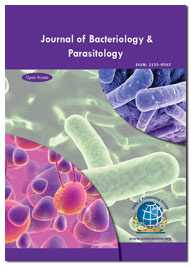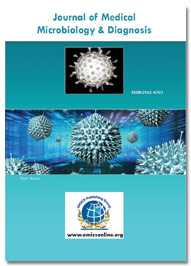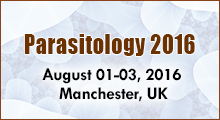Theme: Addressing New Challenges and Emerging Issues in Parasitology
Parasitology 2016
Conferencesseries invites all the participants from all over the world to attend '2nd International Conference on Parasitology' during August 01-03, 2016 in Manchester, UK which includes prompt keynote presentations, Oral talks, Poster presentations and Exhibitions.
- Parasitology Students, Scientists
- Parasitology Researchers
- Parasitology Faculty
- Medical Colleges
- Parasitology Associations and Societies
- Business Entrepreneurs
- Training Institutes
- Manufacturing Medical Devices Companies
ConferenceSeries Ltd invites all the participants from all over the world to attend '2nd International Conference on Parasitology' during August 01-03, 2016 in Manchester, UK which includes prompt keynote presentations, Oral talks, Poster presentations and Exhibitions.
Parasitology-2016 is to gathering people in academia and society interested in parasitology to share the latest trends and important issues relevant to our field/subject area. The scientific program of the conference is broad and embraces different research aspects with focus on applied and ecological Parasitology, and in particular with a veterinary and medical interest. The conference will include invited speakers, oral presentations, poster session and the young scientist award.
Track 1: Parasitology
Parasitic infections/worms can be studied from many angles: we can focus on the parasites, their hosts, the environments they share and the ways in which they interact. People working in this field come from numerous backgrounds, including zoology, physiology, biochemistry, immunology, molecular biology, pharmacology, ecology, economics, anthropology, sociology, engineering, agriculture, education, mathematics and, of course, human and veterinary medicine. Specific disciplines focus on specific aspects, thus parasitological knowledge may be fragmentary.
Related Conferences
Allergy Conferences, September 14-15, 2016 Amsterdam, Netherlands, 2nd World Congress on Infectious Diseases, August 25-27, 2016 Philadelphia, USA; Asthma Events September 14-15, 2016 Amsterdam, Netherlands, Autoimmunity Conferences October 13-14, 2016 Manchester, UK, International Conference on Infectious Diseases & Diagnostic Microbiology, October 3-5, 2016 Vancouver, Canada; 9th Global Summit and Expo on Vaccines & Vaccination, November, USA, November 30-December 02, 2015 San Francisco, USA; 4th International Conference on Immunology, September 28-30, 2015 Houston, Texas, USA; 13th Asia Pacific Global Summit and Expo on Vaccines & Vaccination, November 10-12, 2016 Melbourne, Australia; 27th Annual Meeting of the German Society for Parasitology, March 9–12, 2016, Germany; 91st Annual Meeting of the American Society of Parasitologists, July 11-14, 2016, USA; 92nd Annual Meeting of the American Society of Parasitologists, June 28-July 1, 2017, USA; XII European Multicolloquium of Parasitology, July 20-24, 2016, Finland, The 89th Annual Meeting of the American Society of Parasitologists, July 24-27, 2014 New Orleans, USA, 13th International Congress of Parasitology, August 10-15, 2014 Mexico, 25th Annual Molecular Parasitology Meeting, September 14-18, 2014 Massachusetts, USA, 23rd National Congress of Parasitology, November 18-20, 2013 Chennai, India, Molecular and Cellular Biology of Helminths IX, August 31- September 05, 2015 Greece.
Track 2: Medical Parasitology:
Medical parasitology traditionally has included the study of three major groups of animals: parasitic protozoa, parasitic helminths (worms), and those arthropods that directly cause disease or act as vectors of various pathogens. A parasite is a pathogen that simultaneously injures and derives sustenance from its host. Some organisms called parasites are actually commensals, in that they neither benefit nor harm their host (for example, Entamoeba coli). Although parasitology had its origins in the zoologic sciences, it is today an interdisciplinary field, greatly influenced by microbiology, immunology, biochemistry, and other life sciences.A misconception about Parasitic worms is that they occur only in tropical areas. Although most parasitic infections are more prevalent in the tropics, many people in temperate and subtropical areas also become infected, and visitors to tropical countries may return with a parasite infection.
Related Conferences:
International Conference on Medical Parasitology October 17-19, 2016 Houston, USA, International Conference on Infectious Diseases & Diagnostic Microbiology, October 3-5, 2016 Vancouver, Canada; Immunology Conferences October 13-14, 2016 Manchester, UK, 9th Global Summit and Expo on Vaccines & Vaccination, November, USA, November 30-December 02, 2015 San Francisco, USA;4th International Conference on Immunology, September 28-30, 2015 Houston, Texas, USA; 13th Asia Pacific Global Summit and Expo on Vaccines & Vaccination, November 10-12, 2016 Melbourne, Australia; 27th Annual Meeting of the German Society for Parasitology, March 9–12, 2016, Germany; Autoimmunity Conferences, October 13-14, 2016 Manchester, UK, 2nd World Congress on Infectious Diseases, August 25-27, 2016 Philadelphia, USA; Clinical Immunology conferences, September 14-15, 2016 Amsterdam, Netherlands91st Annual Meeting of the American Society of Parasitologists, July 11-14, 2016, USA; 92nd Annual Meeting of the American Society of Parasitologists, June 28-July 1, 2017, USA; XII European Multicolloquium of Parasitology, July 20-24, 2016, Finland, The 89th Annual Meeting of the American Society of Parasitologists, July 24-27, 2014 New Orleans, USA, 13th International Congress of Parasitology, August 10-15, 2014 Mexico, 25th Annual Molecular Parasitology Meeting, September 14-18, 2014 Massachusetts, USA, 23rd National Congress of Parasitology, November 18-20, 2013 Chennai, India, Molecular and Cellular Biology of Helminths IX, August 31- September 05, 2015 Greece.
Track 3: Veterinary Parasitology
Parasites are responsible for major economic losses in food–producing animals and are important in companion animals. We are able to offer a wide range of services for the study of ectoparasites and endoparasites in both groups.
Parasitic models
· Ectoparasites, including fleas, ticks and biting flies
· Endoparasites, including lung worms and intestinal nematodes
· Species covered include cattle, sheep, goats, camelids, poultry, pigs, horses, dogs and cats
Related Conferences:
Immunology Conferences, October 13-14, 2016 Manchester, UK; 2nd World Congress on Infectious Diseases, August 25-27, 2016 Philadelphia, USA; Asthma Events, September 14-15, 2016 Amsterdam, Netherlands; International Conference on Infectious Diseases & Diagnostic Microbiology, October 3-5, 2016 Vancouver, Canada; 9th Global Summit and Expo on Vaccines & Vaccination, November, USA, November 30-December 02, 2015 San Francisco, USA;4th International Conference and Exhibition on Immunology, September 28-30, 2015 Houston, Texas, USA; 13th Asia Pacific Global Summit on Vaccines & Vaccination, November 10-12, 2016 Melbourne, Australia; 27th Annual Meeting of the German Society for Parasitology, March 9–12, 2016, Germany; 91st Annual Meeting of the American Society of Parasitologists, July 11-14, 2016, USA; 92nd Annual Meeting of the American Society of Parasitologists, June 28-July 1, 2017, USA; XII European Multicolloquium of Parasitology, July 20-24, 2016, Finland, The 89th Annual Meeting of the American Society of Parasitologists, July 24-27, 2014 New Orleans, USA, 13th International Congress of Parasitology, August 10-15, 2014 Mexico, 25th Annual Molecular Parasitology Meeting, September 14-18, 2014 Massachusetts, USA, 23rd National Congress of Parasitology, November 18-20, 2013 Chennai, India, Molecular and Cellular Biology of Helminths IX, August 31- September 05, 2015 Greece.
Track 4: Experimental Immunoparasitology
Immunoparasitology is "the study of the immunology of host-parasite relationships". Parasites are pathogens that simultaneously injure and derive sustenance from its host. They are skilled evaders of host immunity of host pathogen interactions. Parasites are the organisms that complete part or all of their life cycle within a host organism. Infections of humans caused by parasites number in billions and range from relatively innocuous to fatal. The diseases caused by these parasites constitute major human health problems throughout the world. The incidence of many parasitic infections (eg. schistosomiasis, malaria) have increased rather than decreased in recent years. Other parasitic illnesses have increased in importance as a result of the AIDS epidemic (eg., cryptosporidiosis, Pneumocystis carinii pneumonia, and strongyloidiasis).Like other pathogens, parasites must survive in the face of a highly potent immune system. Over millions of years of evolution, they succeed in this through a great diversity of strategies for avoiding immune detection, suppressing cellular immunity and deflecting immune attack mechanisms.Similarly hosts have evolved resistance in various ways to overcome their entry and existence. Host- parasite interactions provide fascinating examples of evolutionary 'arms-races' in which the immune system plays a key role.
Related Conferences:
Autoimmunity Conferences, October 13-14, 2016 Manchester, UK; 2nd World Congress on Infectious Diseases, August 25-27, 2016 Philadelphia, USA; Allergy Conferences, September 14-15, 2016 Amsterdam, Netherlands; International Conference on Infectious Diseases & Diagnostic Microbiology, October 3-5, 2016 Vancouver, Canada; 9th Global Summit and Expo on Vaccines & Vaccination, November, USA, November 30-December 02, 2015 San Francisco, USA;4th International Conference on Immunology, September 28-30, 2015 Houston, Texas, USA; 13th Asia Pacific Global Summit and Expo on Vaccines & Vaccination, November 10-12, 2016 Melbourne, Australia; 27th Annual Meeting of the German Society for Parasitology, March 9–12, 2016, Germany; 91st Annual Meeting of the American Society of Parasitologists, July 11-14, 2016, USA; 92nd Annual Meeting of the American Society of Parasitologists, June 28-July 1, 2017, USA; XII European Multicolloquium of Parasitology, July 20-24, 2016, Finland, The 89th Annual Meeting of the American Society of Parasitologists, July 24-27, 2014 New Orleans, USA, 13th International Congress of Parasitology, August 10-15, 2014 Mexico, 25th Annual Molecular Parasitology Meeting, September 14-18, 2014 Massachusetts, USA, 23rd National Congress of Parasitology, November 18-20, 2013 Chennai, India, Molecular and Cellular Biology of Helminths IX, August 31- September 05, 2015 Greece.
Track 5: Structural & Molecular Parasitology
Structural parasitology is the study of structures of parasitic proteins. Among protozoan parasites, the phylum of Apicomplexa includes organisms responsible for malaria, toxoplasmosis and cryptosporidiosis. Trypanosoma and Leishmania parasites, belonging to the phylum of Kinetoplastida, cause Chagas disease, African Sleeping Disease and visceral leishmaniasis. For some of these diseases, such as malaria, existing drugs face the threat of resistance. For others, such as cryptosporidiosis, there is no effective chemotherapy.
Molecular Parasitology involves molecular biology and biochemistry of parasitic worms and helminths and their interactions with both the definitive and intermediate host. The main subject areas covered are the structure, biosynthesis, degradation, properties and function of DNA, RNA, proteins, lipids, carbohydrates and small molecular-weight substances, drug target characterization and the mode of action of antiparasitic agents.
Related Conferences:
2nd World Congress on Infectious Diseases, August 25-27, 2016 Philadelphia, USA; Clinical Immunology conferences, September 14-15, 2016 Amsterdam, Netherlands; International Conference on Infectious Diseases & Diagnostic Microbiology, October 3-5, 2016 Vancouver, Canada; Immunology Conferences, October 13-14, 2016 Manchester, UK; 9th Global Summit and Expo on Vaccines & Vaccination, November, USA, November 30-December 02, 2015 San Francisco, USA;4th International Conference and Exhibition on Immunology, September 28-30, 2015 Houston, Texas, USA; 13th Asia Pacific Global Summit and Expo on Vaccines & Vaccination, November 10-12, 2016 Melbourne, Australia; 27th Annual Meeting of the German Society for Parasitology, March 9–12, 2016, Germany; 91st Annual Meeting of the American Society of Parasitologists, July 11-14, 2016, USA; 92nd Annual Meeting of the American Society of Parasitologists, June 28-July 1, 2017, USA; XII European Multicolloquium of Parasitology, July 20-24, 2016, Finland, The 89th Annual Meeting of the American Society of Parasitologists, July 24-27, 2014 New Orleans, USA, 13th International Congress of Parasitology, August 10-15, 2014 Mexico, 25th Annual Molecular Parasitology Meeting, September 14-18, 2014 Massachusetts, USA, 23rd National Congress of Parasitology, November 18-20, 2013 Chennai, India, Molecular and Cellular Biology of Helminths IX, August 31- September 05, 2015 Greece.
Track 6: Vector-borne diseases
Vector-borne diseases are parasitic infections transmitted by the bite of infected arthropod species, such as mosquitoes, ticks, triatomine bugs, sandflies, and blackflies. Arthropod vectors are cold-blooded (ectothermic) and thus especially sensitive to climatic factors. Weather influences survival and reproduction rates of vectors, in turn influencing habitat suitability, distribution and abundance; intensity and temporal pattern of vector activity (particularly biting rates) throughout the year; and rates of development, survival and reproduction of pathogens within vectors. However, climate is only one of many factors influencing vector distribution, such as habitat destruction, land use, pesticide application, and host density. It includes:
- Mosquito-borne Diseases
- Sand-fly-borne Diseases
- Tick-borne Diseases
Related Conferences
Allergy Conferences, September 14-15, 2016 Amsterdam, Netherlands, 2nd World Congress on Infectious Diseases, August 25-27, 2016 Philadelphia, USA; Asthma Events September 14-15, 2016 Amsterdam, Netherlands, Autoimmunity Conferences October 13-14, 2016 Manchester, UK, International Conference on Infectious Diseases & Diagnostic Microbiology, October 3-5, 2016 Vancouver, Canada; 9th Global Summit and Expo on Vaccines & Vaccination, November, USA, November 30-December 02, 2015 San Francisco, USA; 4th International Conference on Immunology, September 28-30, 2015 Houston, Texas, USA; 13th Asia Pacific Global Summit and Expo on Vaccines & Vaccination, November 10-12, 2016 Melbourne, Australia; 27th Annual Meeting of the German Society for Parasitology, March 9–12, 2016, Germany; 91st Annual Meeting of the American Society of Parasitologists, July 11-14, 2016, USA; 92nd Annual Meeting of the American Society of Parasitologists, June 28-July 1, 2017, USA; XII European Multicolloquium of Parasitology, July 20-24, 2016, Finland, The 89th Annual Meeting of the American Society of Parasitologists, July 24-27, 2014 New Orleans, USA, 13th International Congress of Parasitology, August 10-15, 2014 Mexico, 25th Annual Molecular Parasitology Meeting, September 14-18, 2014 Massachusetts, USA, 23rd National Congress of Parasitology, November 18-20, 2013 Chennai, India, Molecular and Cellular Biology of Helminths IX, August 31- September 05, 2015 Greece.
.
Track 7: Pathogens: Tropical Veterinary Medicine
For a person or companion animal to acquire a tick-borne disease requires that that individual gets bitten by a tick and that that tick feeds for a sufficient period of time. The feeding time required to transmit pathogens differs for different ticks and different pathogens. Transmission of the bacteria that causes Lyme disease is well understood to require a substantial feeding period.
In the United States, some ticks carry pathogens that can cause human disease, including:
Anaplasmosis is transmitted to humans by tick bites primarily from the blacklegged tick (Ixodes scapularis) in the northeastern and upper midwestern U.S. and the western blacklegged tick (Ixodes pacificus) along the Pacific coast.
Babesiosis is caused by microscopic parasites that infect red blood cells. Most human cases of babesiosis in the U.S. are caused by Babesia microti. Babesia microti is transmitted by the blacklegged tick (Ixodes scapularis) and is found primarily in the northeast and upper midwest.
Borrelia miyamotoi infection has recently been described as a cause of illness in the U.S. It is transmitted by the blacklegged tick (Ixodes scapularis) and has a range similar to that of Lyme disease.
Colorado tick fever is caused by a virus transmitted by the Rocky Mountain wood tick (Dermacentor andersoni). It occurs in the the Rocky Mountain states at elevations of 4,000 to 10,500 feet.
Ehrlichiosis is transmitted to humans by the lone star tick (Ambylomma americanum), found primarily in the southcentral and eastern U.S.
Heartland virus infection has been identified in eight patients in Missouri and Tennessee as of March 2014. Studies suggest that Lone Star ticks may transmit the virus. It is unknown if the virus may be found in other areas of the U.S.
Related Conferences
Allergy Conferences, September 14-15, 2016 Amsterdam, Netherlands, 2nd World Congress on Infectious Diseases, August 25-27, 2016 Philadelphia, USA; Asthma Events September 14-15, 2016 Amsterdam, Netherlands, Autoimmunity Conferences October 13-14, 2016 Manchester, UK, International Conference on Infectious Diseases & Diagnostic Microbiology, October 3-5, 2016 Vancouver, Canada; 9th Global Summit and Expo on Vaccines & Vaccination, November, USA, November 30-December 02, 2015 San Francisco, USA; 4th International Conference on Immunology, September 28-30, 2015 Houston, Texas, USA; 13th Asia Pacific Global Summit and Expo on Vaccines & Vaccination, November 10-12, 2016 Melbourne, Australia; 27th Annual Meeting of the German Society for Parasitology, March 9–12, 2016, Germany; 91st Annual Meeting of the American Society of Parasitologists, July 11-14, 2016, USA; 92nd Annual Meeting of the American Society of Parasitologists, June 28-July 1, 2017, USA; XII European Multicolloquium of Parasitology, July 20-24, 2016, Finland, The 89th Annual Meeting of the American Society of Parasitologists, July 24-27, 2014 New Orleans, USA, 13th International Congress of Parasitology, August 10-15, 2014 Mexico, 25th Annual Molecular Parasitology Meeting, September 14-18, 2014 Massachusetts, USA, 23rd National Congress of Parasitology, November 18-20, 2013 Chennai, India, Molecular and Cellular Biology of Helminths IX, August 31- September 05, 2015 Greece.
Track 8: Pathogenesis and Immunity
Resistance to parasitic worms/protozoa appears to be similar to resistance against other infectious agents, although the mechanisms of resistance in protozoan infections are not yet as well understood. Resistance can be divided into two main groups of mechanisms: (1) nonspecific mechanism(s) or factor(s) such as the presence of a nonspecific serum component that is lethal to the parasite; and (2) specific mechanism(s) involving the immune system. Probably the best studied nonspecific mechanisms involved in parasite resistance are the ones that control the susceptibility of red blood cells to invasion or growth of plasmodia, the agents of malaria.
Related Conferences:
Allergy Conferences, September 14-15, 2016 Amsterdam, Netherlands, 2nd World Congress on Infectious Diseases, August 25-27, 2016 Philadelphia, USA; Asthma Events September 14-15, 2016 Amsterdam, Netherlands, Autoimmunity Conferences October 13-14, 2016 Manchester, UK, International Conference on Infectious Diseases & Diagnostic Microbiology, October 3-5, 2016 Vancouver, Canada; 9th Global Summit and Expo on Vaccines & Vaccination, November, USA, November 30-December 02, 2015 San Francisco, USA; 4th International Conference on Immunology, September 28-30, 2015 Houston, Texas, USA; 13th Asia Pacific Global Summit and Expo on Vaccines & Vaccination, November 10-12, 2016 Melbourne, Australia; 27th Annual Meeting of the German Society for Parasitology, March 9–12, 2016, Germany; 91st Annual Meeting of the American Society of Parasitologists, July 11-14, 2016, USA; 92nd Annual Meeting of the American Society of Parasitologists, June 28-July 1, 2017, USA; XII European Multicolloquium of Parasitology, July 20-24, 2016, Finland, The 89th Annual Meeting of the American Society of Parasitologists, July 24-27, 2014 New Orleans, USA, 13th International Congress of Parasitology, August 10-15, 2014 Mexico, 25th Annual Molecular Parasitology Meeting, September 14-18, 2014 Massachusetts, USA, 23rd National Congress of Parasitology, November 18-20, 2013 Chennai, India, Molecular and Cellular Biology of Helminths IX, August 31- September 05, 2015 Greece.
.
Track 9: Malaria Research
Around 50% of the confirmed malaria cases are P. vivax cases. Several elements make it difficult to control: it has a unique biology (generation of hypnzoites in the liver stage) with a large prevalence of asymptomatic cases among semi-immune populations, it responds differently to anti-malarials than P. falciparum and research in the past years on P. vivax has been poorly funded leading to few tools and approaches for control, the current tools for radical cure (14-days of primaquine) poses a challenge of adherence to treatment and in places where P. vivax transmission occurs, mixed infections with P. falciparum are common. Basic and operational research on P. vivax needs to be expanded and strong BCC programs are required to ensure adherence to treatments. In addition, regional cooperation networks could be created to share practices on the control of P. vivax malaria.
Related Conferences:
Allergy Conferences, September 14-15, 2016 Amsterdam, Netherlands, 2nd World Congress on Infectious Diseases, August 25-27, 2016 Philadelphia, USA; Asthma Events September 14-15, 2016 Amsterdam, Netherlands, Autoimmunity Conferences October 13-14, 2016 Manchester, UK, International Conference on Infectious Diseases & Diagnostic Microbiology, October 3-5, 2016 Vancouver, Canada; 9th Global Summit and Expo on Vaccines & Vaccination, November, USA, November 30-December 02, 2015 San Francisco, USA; 4th International Conference on Immunology, September 28-30, 2015 Houston, Texas, USA; 13th Asia Pacific Global Summit and Expo on Vaccines & Vaccination, November 10-12, 2016 Melbourne, Australia; 27th Annual Meeting of the German Society for Parasitology, March 9–12, 2016, Germany; 91st Annual Meeting of the American Society of Parasitologists, July 11-14, 2016, USA; 92nd Annual Meeting of the American Society of Parasitologists, June 28-July 1, 2017, USA; XII European Multicolloquium of Parasitology, July 20-24, 2016, Finland, The 89th Annual Meeting of the American Society of Parasitologists, July 24-27, 2014 New Orleans, USA, 13th International Congress of Parasitology, August 10-15, 2014 Mexico, 25th Annual Molecular Parasitology Meeting, September 14-18, 2014 Massachusetts, USA, 23rd National Congress of Parasitology, November 18-20, 2013 Chennai, India, Molecular and Cellular Biology of Helminths IX, August 31- September 05, 2015 Greece, XIX International Congress for Tropical Medicine and Malaria, 18-22, sept, Brisbane, Australia
Track 10: Approaches: Parasitic Disease Control
Control and eventual elimination of human parasitic diseases requires novel approaches, particularly in the areas of diagnostics, mathematical modelling, monitoring, evaluation, surveillance and public health response.Recent developments in new diagnostic tools, however, have opened new avenues for a vast improvement in parasite detection. Firstly, a number of newer serology-based assays that are highly specific and sensitive have emerged, such as the Falcon assay screening test ELISA (FAST-ELISA) , Dot-ELISA , rapid antigen detection system (RDTS) , and luciferase immunoprecipitation system (LIPS) . Secondly, molecular-based approaches such as loop-mediated isothermal amplification (LAMP) , real-time polymerase chain reaction , and Luminex have shown a high potential for use in parasite diagnosis with increased specificity and sensitivity. Thirdly, proteomic technology has also been introduced for the discovery of biomarkers using tissues or biological fluids from the infected host.
Related Conferences:
Allergy Conferences, September 14-15, 2016 Amsterdam, Netherlands, 2nd World Congress on Infectious Diseases, August 25-27, 2016 Philadelphia, USA; Asthma Events September 14-15, 2016 Amsterdam, Netherlands, Autoimmunity Conferences October 13-14, 2016 Manchester, UK, International Conference on Infectious Diseases & Diagnostic Microbiology, October 3-5, 2016 Vancouver, Canada; 9th Global Summit and Expo on Vaccines & Vaccination, November, USA, November 30-December 02, 2015 San Francisco, USA; 4th International Conference on Immunology, September 28-30, 2015 Houston, Texas, USA; 13th Asia Pacific Global Summit and Expo on Vaccines & Vaccination, November 10-12, 2016 Melbourne, Australia; 27th Annual Meeting of the German Society for Parasitology, March 9–12, 2016, Germany; 91st Annual Meeting of the American Society of Parasitologists, July 11-14, 2016, USA; 92nd Annual Meeting of the American Society of Parasitologists, June 28-July 1, 2017, USA; XII European Multicolloquium of Parasitology, July 20-24, 2016, Finland, The 89th Annual Meeting of the American Society of Parasitologists, July 24-27, 2014 New Orleans, USA, 13th International Congress of Parasitology, August 10-15, 2014 Mexico, 25th Annual Molecular Parasitology Meeting, September 14-18, 2014 Massachusetts, USA, 23rd National Congress of Parasitology, November 18-20, 2013 Chennai, India, Molecular and Cellular Biology of Helminths IX, August 31- September 05, 2015 Greece.
Track 11: Fish Parasitic Diseases
The majority of the fish parasites which cause disease in fish include protozoal parasites. Typically, these parasites are present in large numbers either on the surface of the fish, within the gills, or both. When they are present in the gills, they cause problems with respiration and death will commonly occur when additional stressors are present in the aquatic environment. Protozoal parasites on the skin, fins or scales only, (i.e., not affecting the gills) usually do not result in death, unless they are accompanied by a secondary bacterial infection. These include species found on external surfaces and species found in specific organs. Most protozoa have direct life cycles, but the myxosporidia require an invertebrate intermediate host.
Related Conferences
4th International Conference on Aquaculture & Fisheries, September 29-October 01, 2016 London, UK; Clinical Immunology conferences ,September 14-15, 2016 Amsterdam, Netherland; s2nd Global Summit on Aquaculture & Fisheries, July 11-13, 2016 Kuala Lumpur, Malaysia, 91st Annual Meeting of the American Society of Parasitologists, July 11-14, 2016, USA; 92nd Annual Meeting of the American Society of Parasitologists, June 28-July 1, 2017, USA; XII European Multicolloquium of Parasitology, July 20-24, 2016, Finland.2nd World Congress on Infectious Diseases, August 25-27, 2016 Philadelphia, USA; Allergy Conferences, September 14-15, 2016 Amsterdam, Netherlands, 2nd World Congress on Infectious Diseases, August 25-27, 2016 Philadelphia, USA; Asthma Events September 14-15, 2016 Amsterdam, Netherlands, Autoimmunity Conferences October 13-14, 2016 Manchester, UK, International Conference on Infectious Diseases & Diagnostic Microbiology, October 3-5, 2016 Vancouver, Canada; 9th Global Summit and Expo on Vaccines & Vaccination, November, USA, November 30-December 02, 2015 San Francisco, USA; 4th International Conference on Immunology, September 28-30, 2015 Houston, Texas, USA; 27th Annual Meeting of the German Society for Parasitology, March 9–12, 2016, Germany; 91st Annual Meeting of the American Society of Parasitologists, July 11-14, 2016, USA; 92nd Annual Meeting of the American Society of Parasitologists, June 28-July 1, 2017, USA; XII European Multicolloquium of Parasitology, July 20-24, 2016, Finland, The 89th Annual Meeting of the American Society of Parasitologists, July 24-27, 2014 New Orleans, USA, 13th International Congress of Parasitology, August 10-15, 2014 Mexico, 25th Annual Molecular Parasitology Meeting, September 14-18, 2014 Massachusetts, USA, 23rd National Congress of Parasitology, November 18-20, 2013 Chennai, India, Molecular and Cellular Biology of Helminths IX, August 31- September 05, 2015 Greece.

Dear Colleagues & Friends,
On behalf of the Organizing Committee it is my pleasure to welcome you to the 2nd International Conference on Parasitology which special focus on “New Challenges and Emerging Issues in Parasitology”.
Conference will provide an overview of the latest progress in the field. It is comprised of 22 tracks and 82 sessions designed to offer comprehensive sessions that address current issues in experimental, clinical, molecular, biochemical, quantitative parasitology.
We look forward to get together and discuss about the latest research and advancements where interaction with your colleagues from many countries will certainly lead to the creative exchange of ideas and upcoming collaborations.
We wish everyone a fruitful meeting and memorable stay in Manchester!!
Kind Regards,
Ingrid Papajova, Director
Institute of Parasitology of the Slovak Academy of Sciences
Slovakia
About the UK Animal Medicines Industry
The UK market for animal medicines
Approximate sales by product type (£m at ex-manufacturers prices, net of all discounts)
|
Type of Product |
2005 | 2006 | 2007 | 2008 | 2009 | 2010 | 2011 | 2012 | 2013 | 2014 | 2015 |
|---|---|---|---|---|---|---|---|---|---|---|---|
| Endoparasiticides | 43.9 | 46.6 | 44.7 | 51 | 54.4 | 57.3 | 55.3 | 73.2 | 89 | 84 | 84 |
| Ectoparasiticides | 69.6 | 71.9 | 87.5 | 88.1 | 89.4 | 94.3 | 107.6 | 113.3 | 119 | 141 | 144 |
| Endectocides | 18.7 | 16.2 | 15.7 | 17 | 17.6 | 14.9 | 15.7 | 17.5 | 24 | 24 | 24 |
| Vaccines | 84.6 | 82.6 | 87.1 | 117.5 | 103.4 | 112.4 | 120 | 123.8 | 131.5 | 134 | 136 |
| Antimicrobials | 83.1 | 81.1 | 76.7 | 80.7 | 81.4 | 86 | 78.8 | 82.2 | 95 | 98 | 99 |
| Medicines for reproductive problems | 12.5 | 13.3 | 15.2 | 17.1 | 19.2 | 20.2 | 22.3 | 22.4 | 25 | 28 | 28 |
| Anti-inflammatories | 25.7 | 25.7 | 26.4 | 25.7 | 28.9 | 30.1 | 28.9 | 29.1 | 31 | 35 | 36 |
| Others | 35.9 | 35.8 | 52.5 | 54.1 | 57.6 | 53.9 | 50.3 | 36.8 | 50 | 58 | 59 |
| Total (Survey figure) | 374 | 373.2 | 405.9 | 451.4 | 452 | 469 | 479 | 498.3 | 565 | 601 | 610 |
The market is broken down into vaccines, therapeutics, and diagnostic products. The vaccines segment has the largest share of the market, worth an estimated $3.2 billion in 2009. This segment is expected to grow at a CAGR of 5.6% to reach nearly $4.2 billion in 2014. The therapeutics segment has the second-largest share of the market with $2.1 billion in 2009. But that segment is expected to decrease at a CAGR of -2.4%, falling to $1.9 billion in 2014. As many as 500,000 people die of influenza annually and with the threat of a pandemic, government agencies and disease-prevention organizations are devoted to gaining control of the situation. Many companies have been asked to assist with the problem and others are furthering their position with backing from government agencies. The next five years will continue to display support and funding for many research and development programs, product development and pandemic prevention and/or control by worldwide governments, organizations, and health care professionals.
Conference Highlights
- Parasitology
- Medical Parasitology
- Veterinary Parasitology
- Experimental Immunoparasitology
- Structural and Molecular Parasitology
- Vector-Borne Viral Diseases
- Tropical Medicine Parasitology
- Pathogenesis and Immunity
- Malaria Research
- Fish Parasitic Diseases
- Approaches: Parasitic Disease Control
- Parasite Treatments
- Skin Parasites
- Parasitic Worms
- Stool Parasites
- Advances in Parasite Medications
- Eye Parasites
- Brain Parasites
- Blood Parasites
- Parasite Remedies
- Water Parasites
- Ticks and Tick-borne Pathogens in Tropical Veterinary Medicine
To share your views and research, please click here to register for the Conference.
To Collaborate Scientific Professionals around the World
| Conference Date | August 01-03, 2016 | ||
| Sponsors & Exhibitors |
|
||
| Speaker Opportunity Closed | Day 1 | Day 2 | Day 3 |
| Poster Opportunity Closed | Click Here to View | ||
Useful Links
Special Issues
All accepted abstracts will be published in respective Our International Journals.
- Journal of Bacteriology & Parasitology
- Journal of Medical Microbiology & Diagnosis
- Journal of Tropical Diseases & Public Health
Abstracts will be provided with Digital Object Identifier by















